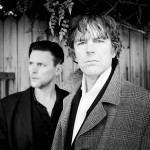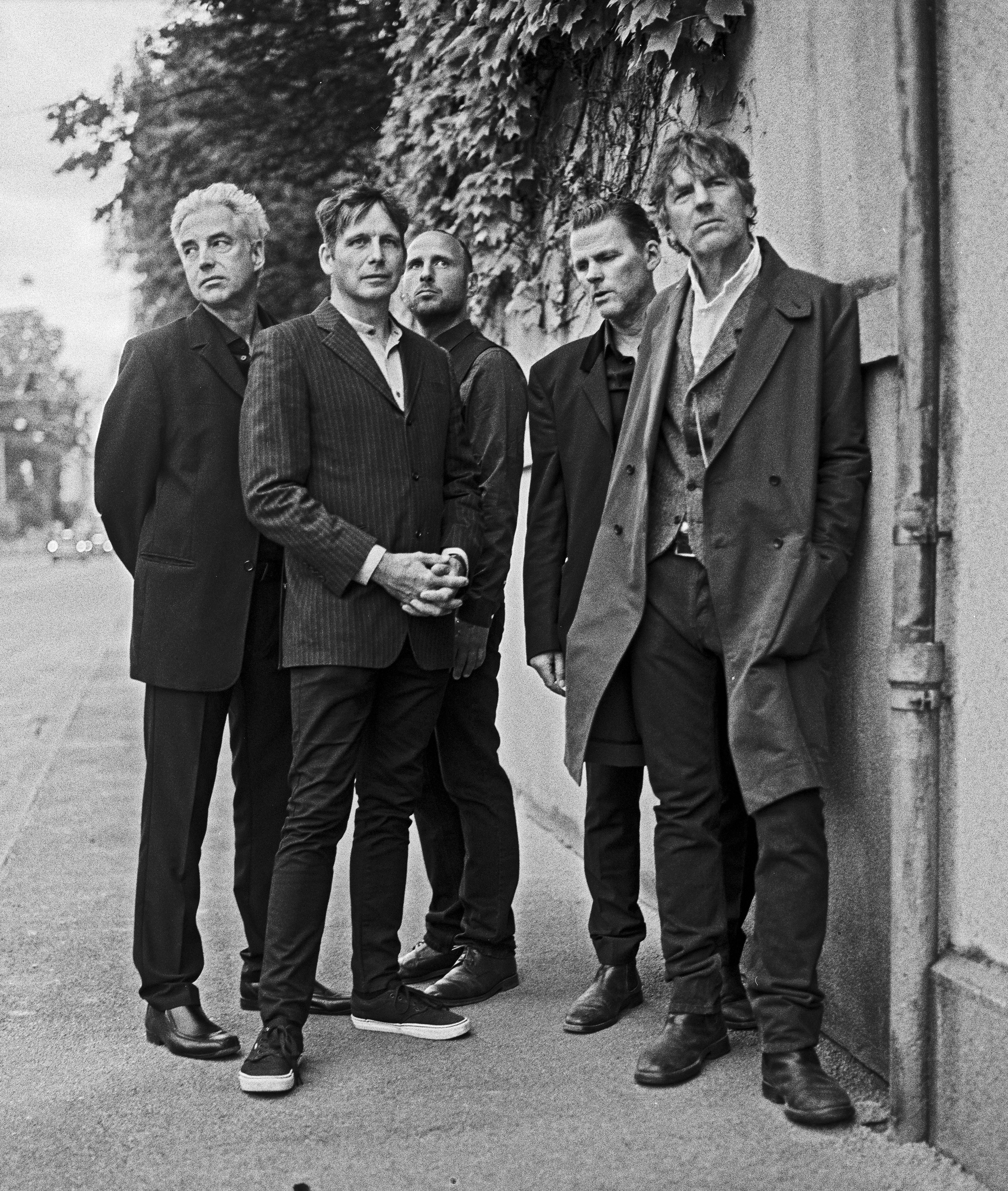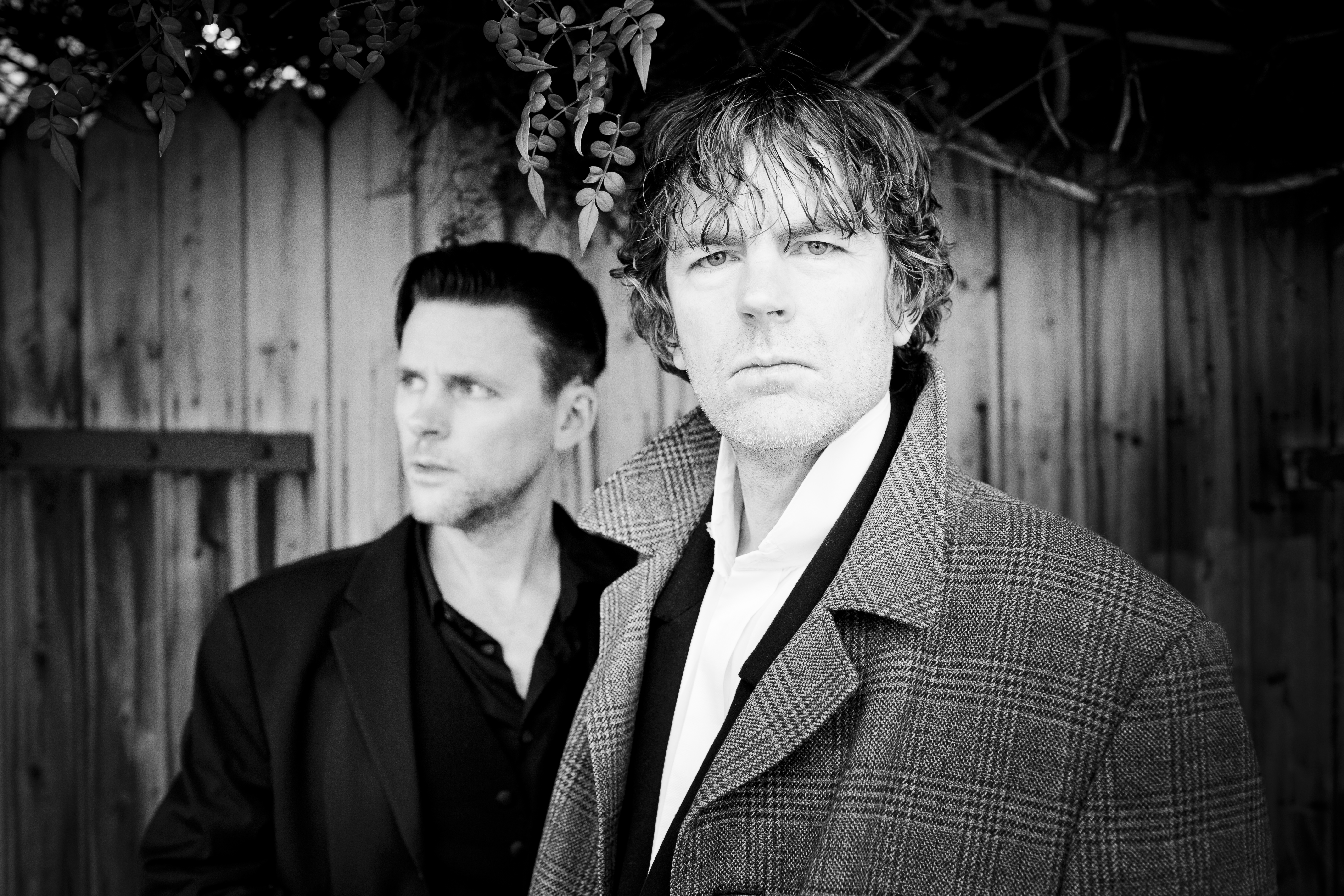 If you consider that And Also The Trees have been constantly active since the end of the 70s and have never rested on their past laurels, and if you also take into account that their music, despite all stylistic movements and developments – from the rabid post-punk of the first recordings to the “slightly dark rock music infused with melancholy” of the classic albums to excursions into jazz and Americana – always follows a tangible thread, then you can definitely speak of the “Slow Pulse Boys” around singer Simon Huw Jones and guitarist Justin Jones as of an exceptional band. Initially founded in rural Worcestershire by two pairs of brothers (besides the Jones brothers, these were Nick and Graham Havas), And Also The Trees are not only creative musicians – they are also great storytellers in their songs, sending the “wandering spirit of AATT” on a journey through time to explore exciting events in striking locations and to put them into poetic lyrics. The following interview, which we did with Simon and Justin after the last concert tour, is about this spirit and a lot more.
If you consider that And Also The Trees have been constantly active since the end of the 70s and have never rested on their past laurels, and if you also take into account that their music, despite all stylistic movements and developments – from the rabid post-punk of the first recordings to the “slightly dark rock music infused with melancholy” of the classic albums to excursions into jazz and Americana – always follows a tangible thread, then you can definitely speak of the “Slow Pulse Boys” around singer Simon Huw Jones and guitarist Justin Jones as of an exceptional band. Initially founded in rural Worcestershire by two pairs of brothers (besides the Jones brothers, these were Nick and Graham Havas), And Also The Trees are not only creative musicians – they are also great storytellers in their songs, sending the “wandering spirit of AATT” on a journey through time to explore exciting events in striking locations and to put them into poetic lyrics. The following interview, which we did with Simon and Justin after the last concert tour, is about this spirit and a lot more.
Literature and above all poetry has always played a major role in your music in the form of references (take for example your references to William Cowper or Robert Burns). What literature are you currently reading? Are there any authors, that you would say are closely connected to the music you make?
SHJ – It’s more literature than poetry, although back in the time when we quoted Cowper I used to get inspiration, or help, from single lines from poems rather than poems in their entirety. As a lyricist I am greatly indebted to novelists and occasionally non-fiction writers from all periods. At the moment I’m reading Jim Harrison and for some time have been reading contemporary novels… Sebastian Barry, Claire Keegan, Colm Toibin occasionally dipping back to Chekhov, Hemingway, Hardy. I am careful about what I read as I take inspiration from the general feel of whatever I’m reading so there are no particular authors that are connected to our music – it’s more like all of them. They are my personal heroes.
Your music has often been described as nostalgic and associated with eras such as Classicism and Romanticism, many references, the artwork and the atmosphere of the music also suggest this. What exactly do you draw from studying past times?
SHJ – I’d say those references are mostly in respect to our albums before the mid 90’s when we were taking a lot from our rural upbringing, our location, and exploring it’s past. That was a very exciting time for us because we were discovering a lot of things at the same time – we were seeing our surroundings in a different, more perceptive way, we were discovering a lot of art including the Pre Raphaelites painters, of which there were many good examples in Birmingham’s art gallery which was our nearest big city, and we were starting to understand and appreciate jazz and classical music and read 19 century literature.
Those discoveries are not usually affiliated with rock music so we were going against the grain and it was hard for many critics, especially English ones, to take. But this sort of made it more exciting for us and that gave energy. The way we dressed also had something to do with this – this was actually a result of us having to buy our clothes from jumble sales and charity shops as we had so little to spend, but it was a strong image and unique to us at the time and opened the door to these links to romanticism and Classicism.
Since those times we have gravitated towards the present day – but this drifting backward and forwards through time is part of our makeup and we do it at will – sometimes within the boundaries of a single song.
One could say that in the music and lyrics of And Also The Trees there is a kind of translation of historical inspirations into the code of our time. In case you agree, is this translation something you do consciously, or does it happen more automatically?
SHJ … exactly, well put. It is mostly an instinctive thing. At times I deliberately bring modernity into a lyric … like piles of wrecked cars or flickering TV screens to bring the mind, the song, back to where we are now, but mostly it comes naturally. After all most of our most impressive emotions are not exactly new to the world.
Does the idea of living in a different historical time appeal to you?
JJ: I think most people would quite like the chance of jump around in time. I read HG Wells’ novel The Time Machine again recently and it is fascinating and slightly worrying what becomes of us.
If you were to find a common thread running through all your albums from your self-titleddebut up to “The Bone Carver“, what would that be?
JJ: That’s a good question but quite hard for me to answer. Whilst the first album was a collection of songs written by teenagers I suppose you can see/hear a lyrical style forming, and that (hopefully) resonates with the musical ideas. The line up of the band has changed since we first started a few times, I counted 10 different versions of AATT going through our history. It is Simon and I have that remained the constant core so you can probably hear this.
Recently there have been a couple of books about (the history of) Goth. Do you feel in any way that there is some common ground with what you do and bands that may be (mis)labeled as “gothic“?
JJ: Post Punk is a far more accurate description of where AATT came from, I don’t really like the term ‘goth’. I remember hearing it for the first time in 1984/85 and thinking it didn’t have any relevance to AATT. Perhaps it ‘splits hairs’ to say that there was a cross over with ‘gothic’ as that seemed to relate to the literature movement from the nineteenth century which I understand people perceive AATT to have an association with.
I believe AATT will make an appearance in Lol Tolhurst’s book (titled ‘Goth’). I did a brief interview with Lol for his new book but didn’t at the time know what the book would later be called.It’s quite funny because there are a few bands that really are quite far away from the genre that are really happy to jump on the bandwagon possibly because it has become en vogue recently…
There was the time when you recorded some albums that were more closely connected to (a certain period in the history of) the USA. Could you say a few words about how that happened and would you say it was kind of a gradual development?
SHJ – It was gradual, then sudden… if that makes sense. What we thought of as the ‘roaming spirit of ‘and also the trees’’ was edging towards a more modern, urban world with songs like ‘Red Valentino’ and ‘Sickness divine’ then we… or more like Justin, took the plunge with ‘Angelfish’ and led by the change in his guitar sound to a twangy 50’s influenced style, we moved into a kind of fantasised, Americana influenced, Jazz world… trying somehow keeping in touch with who and what we always were. It was a generally successful attempt at leaving our pastoral, romantic image behind. We felt we had become too typecast and wanted to break free. Naturally, not all of our followers liked it as the reason they followed us was because they like us how we were… but we needed it creatively.
Real or fictional places always play a major role in your texts, from landscapes to specific addresses. Together with the mood of the music, the idea of an imaginary film scene can then quickly arise. Is such an effect intended and could you imagine your music in a cinematic context?
JJ : When I was younger I wanted to be a composer for film. That didn’t happen for many obvious reasons but it does seem to be part of the make-up of AATT music.
Growing up I was most moved by film music or indeed TV music of that time, the late 60’s early 70’s.
Simon writes (lyrics) in a certain way that lends itself to a ‘soundtrack’ approach. With the current musicians that are in AATT I think this works very well. We don’t really write conventional ‘songs’ that often because I am not that good at it. So our style seems to follow a more unusual path. We are quite ‘visual’ as people and so I think of each work as a mini film. I can’t imagine trying to write over 200 songs that are in the ‘pop’ mode, that would be a kind of hell.
How much do your experiences on tour and the feedback from the audience shape your musical development?
SHJ – Touring is a big life experience for us and it has shaped us into becoming who we are today both musically and in person. The positivity of the crowds reaction is also important simply because it shows that we are connecting with people – which is a big part of what making and playing music is all about.
You have played in different countries, including Japan, and one of the most loyal fan communities is probably in Greece. How different are the experiences in different countries?
JJ: Different of course. But not as different as you might imagine. Some cultural nuances as you would expect. But apart from some parts of Italy where people just talk all the way through the show, there seems to be a fascination that our audience has all around the world. We are lucky to have that connection with people. It can be quite moving.
What criteria do you have when it comes to choosing certain older songs for concerts?
SHJ – We have to still feel and understand the energy of the songs – wether that is the original energy or one that has evolved and on a practical level we assess if it is a song our audience particularly like and wether we can play it well enough to do it justice. Not all songs work on stage which can be frustrating. 
When you played in Cologne, you asked the audience whether anybody was there that hadn’t seen you before and then you introduced “Virus Meadow“ by saying: “This is for you.“ Would you say that this is a kind of signature song for you?
SHJ – I said that a few times on the last tour just to see what sort of percentage were seeing us for the first time. It wasn’t very high but there were always some. And I suppose you could call Virus meadow a kind of signature tune, it’s the one that most reminds me of the Hamlet where we grew up and formed the band – we have played it hundreds of times now and it feels good to know that there are some in the audience who are hearing it live for the first time.
Does it happen that at some point you can no longer identify with some older pieces?
SHJ – Not often surprisingly… perhaps because so few of our songs are lyrically linked directly to personal experiences and are not specifically coming from a youthful source.
If you had to recommend an album or two to someone who is just getting to know your music, what would it be?
JJ: It would probably be ‘The Bone carver’. I think the path backward from that is quite an interesting one with some odd choices made along the way.
Over the years you have released two albums of acoustic interpretations of some of your songs. Could you imagine yourselves recording a purely acoustic album with completely new songs?
JJ: At this moment I couldn’t see us working on a new ‘acoustic’ project. That was a chapter in our existence that I feel we have passed, for now at least. Looking back at those acoustic recordings I’m not sure how successful they were ‘artistically’. It was a good project that was essentially a live experience for the stage or wherever we happened to perform. Some of those shows are amongst the most exciting events I have ever done. But the recordings …I’m not so sure.
What has happened since that time is that we created the ‘Brothers of the trees’ shows that are electric in their approach with a strong element of improvisation. We called it ‘Brothers of the Trees’ to start with as it was just Simon and I who performed. Since then it expanded sometimes and contracted depending on the event or stage/venue. These shows were mostly different versions of existing AATT material played in new ways. Having done a number of these performances we thought it would be a good exercise to create new works. So this is a current project that has been running in parallel with other projects and one day we will write, record and release an album of new material played in this way under the name of And Also The Trees but with a note that it is from, or in the Brothers’ mindset.
Having been around for decacdes now, you still manage to write, record and release new material whereas some other bands just play their old songs over and over again. How How do your songs usually come about? Do you sometimes develop them together, or is it more the case that just because you live in different places, someone comes up with an idea and the others react to it?
SHJ – Justin starts it all with a guitar idea and the rest of us work around that. I think the recording of ‘Further from the truth’ in 2003 was like a new beginning for us and we have built from there with what we’d learnt from the previous decades. We are always learning.
Have you ever thought of working in/with different media than music?
SHJ – Personally I am a photographer, an ex pro from pre digital days and continue to work… print, develop… in the old analogue way. Justin works in film and Paul is also a visual artist… so we are already in different areas. We often say we are more like artists that make music than musicians that make art.
This may sound a bit too profane, but do you feel that you have found a way of surviving the changed music industry with your way of touring and releasing records (on your own label)?
JJ: This is quite an in-depth subject that could take up a whole interview. But briefly, we have been in the process of independence for many, many years. There are good labels and – shall we say – not such good labels. It seemed logical to me for ‘the band’ to be in control of AATT in order to survive. Even without the peripheral forces there seem to be new ‘challenges’ all the time. We haven’t got that quite right yet but at least we are still here and live to fight another day.
Do you know Birch Book’s folky version of your “Jacob Fleet” and how do you like the idea of translating your music into a folk music guise?
SHJ – No I don’t know it. I’d take it as a compliment.
Interview: M.G. und U.S.
